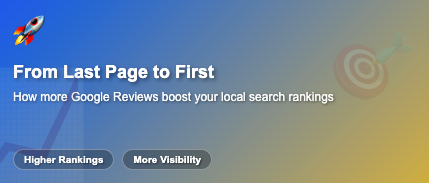Search engine optimisation has evolved dramatically over the past decade, and one factor has emerged as particularly crucial for local businesses: Google reviews. The quantity, quality, and recency of your reviews directly impact where your business appears in search results, often determining whether potential customers find you on the first page or never discover you at all.
Understanding Google's Local Search Algorithm
Google's primary goal is to provide users with the most relevant and trustworthy results for their searches. When someone searches for "restaurants near me" or "best plumber in [city]," Google's algorithm evaluates hundreds of factors to determine which businesses to display and in what order.
Reviews have become one of the most significant ranking factors because they provide Google with real-time data about business quality and customer satisfaction. From Google's perspective, businesses with more positive reviews are more likely to satisfy users, making them better search results.
The algorithm considers several review-related factors: total number of reviews, average star rating, recency of reviews, review velocity (how quickly you're gaining new reviews), and even the diversity of review sources. Businesses that excel in these areas consistently outrank competitors with fewer or older reviews.
The Review Volume Advantage
One of the most straightforward ways reviews impact rankings is through sheer volume. Businesses with 50+ reviews typically rank higher than those with fewer than 10 reviews, assuming other factors are relatively equal. This creates a compounding effect – higher rankings lead to more visibility, which can result in more customers and potentially more reviews.
Google interprets review volume as a signal of business popularity and activity. A restaurant with 200 reviews suggests a busy, established business, while one with 15 reviews might appear less popular or newer to the market. This perception influences not only algorithm decisions but also customer behaviour.
However, it's not just about having the most reviews. Google also evaluates review velocity – how quickly you're accumulating new reviews. A business that gains 10 new reviews per month appears more active and engaging than one that gained 100 reviews two years ago but only 5 in the past year.
Recent Reviews Signal Current Relevance
Search engines prioritise fresh, current content, and this principle extends to reviews. Recent reviews signal to Google that your business is currently active and serving customers. Businesses with reviews from the past week or month often receive ranking boosts over competitors whose most recent reviews are several months old.
This emphasis on recency means that businesses cannot rely on past review success. Consistent review generation becomes essential for maintaining and improving search rankings. The businesses that understand this principle and systematically encourage ongoing reviews tend to maintain stronger search positions over time.
Star Ratings and Ranking Correlation
While Google has never explicitly stated that star ratings directly influence rankings, numerous studies show a strong correlation between higher average ratings and better search positions. Businesses with 4.0+ star averages tend to rank higher than those with lower ratings, particularly when the higher-rated businesses also have substantial review volumes.
The relationship between ratings and rankings makes sense from user experience perspective. Google wants to recommend businesses that will satisfy users, and high star ratings suggest customer satisfaction. Additionally, higher-rated businesses tend to receive more clicks from search results, which Google interprets as another positive ranking signal.
Review Keywords and Local SEO
The content within reviews also influences search rankings, particularly for local SEO. When customers mention specific services, products, or location details in reviews, these keywords help Google understand what your business offers and where you're located.
For example, if multiple reviews mention "best pizza in downtown" or "great emergency plumbing service," Google associates your business with those terms and may rank you higher for related searches. This organic keyword integration is often more valuable than forced keyword stuffing in business descriptions.
Google My Business Optimisation
Reviews are a crucial component of Google My Business (GMB) optimisation, which directly affects local search rankings. GMB profiles with regular review activity, high ratings, and detailed review responses tend to perform better in local search results.
Google uses GMB signals heavily in local search algorithms, and reviews represent real-time customer feedback that helps Google assess business quality. Businesses that actively manage their GMB profiles and encourage reviews often see significant improvements in local search visibility.
The Competitive Ranking Battle
In competitive markets, reviews often become the deciding factor in search rankings. When multiple businesses have similar websites, location relevance, and other SEO factors, the business with stronger review profiles frequently wins the top positions.
This creates a competitive dynamic where businesses must actively work to maintain and improve their review profiles. Those that become complacent with their review generation often find themselves sliding down search results as competitors with more active review strategies overtake them.
Review Response Impact on Rankings
How businesses respond to reviews may also influence search rankings. Google appears to favour businesses that actively engage with customer feedback, viewing this as a signal of good customer service and business management. Regular review responses demonstrate that businesses are monitoring their online presence and care about customer experience.
Long-term SEO Strategy
Building search rankings through reviews requires long-term strategic thinking. Unlike some SEO tactics that can produce quick results, review-based ranking improvements develop over time as you accumulate more customer feedback.
The most successful businesses integrate review generation into their ongoing operations, creating systems that consistently encourage satisfied customers to share their experiences. They understand that every new positive review potentially improves their search visibility and competitive position.
Search engine rankings determine business visibility in our digital economy. Google reviews have become one of the most reliable ways to improve those rankings, particularly for local businesses. The businesses that recognise this connection and systematically build their review profiles are the ones that dominate search results and capture more potential customers. Every review represents not just customer feedback, but a vote for better search visibility and business growth.





